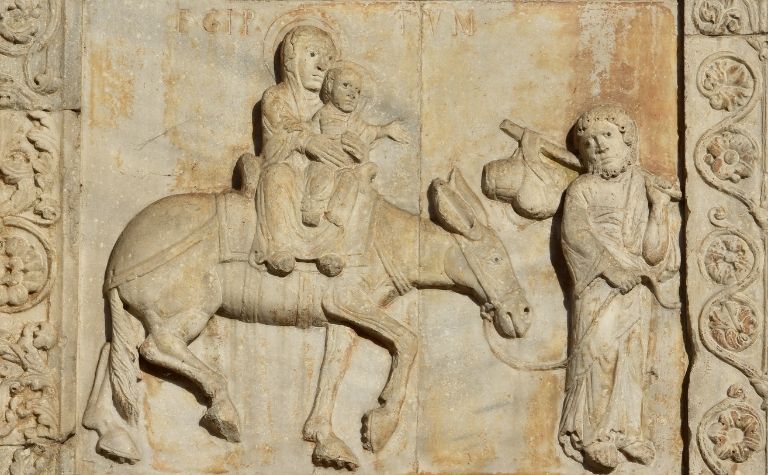People fleeing their country due to war, persecution, or natural disasters have occurred throughout history. Some countries welcome refugees seeking food, clothing, shelter, and protection. Others deny them for different reasons, such as the fear of not having enough resources to share. Reading about Jesus in the Gospels leads some to ask whether or not he was a refugee.
Jesus was a refugee when Joseph took him and Mary to Egypt to escape Herod’s death threats. The family of three left their country, Israel, and sought refuge in another place, Egypt, to avoid death. Egypt had a large Jewish population that likely helped Jesus and his parents until they returned home.
Why did Herod want to kill Jesus? How did he know to target children under two? Did Herod commit other evil atrocities? Where did the family go when they returned home? Keep reading to learn the answers to these questions and others.
Also see Was Jesus Perfect? to learn more.

Why did Herod want to kill Jesus?
When the wise men arrived to visit Jesus, they asked, “Where is he who has been born king of the Jews? For we saw his star when it rose and have come to worship him” (Matt. 2:2). This upset Herod. Wise men from a foreign land sought to pay homage to a socially insignificant Jewish child over him?
Herod summoned the magi and learned more about when the star appeared. Then he told them to “go and search diligently for the child, and when you have found him, bring me word, that I too may come and worship him” (2:8). Herod had no intention of worshipping Joseph and Mary’s son.
Herod’s sinister plot to learn Jesus’ location was foiled when the wise men had a dream. “And being warned in a dream not to return to Herod, they departed to their own country by another way” (v. 12). This infuriated Herod. The wise men fled home and Jesus eluded Herod’s murderous grasp.
Jesus, Mary, and Joseph flee to Egypt
Herod didn’t take kindly to the wise men duping him, and his rage had widespread ramifications for those he governed. Yet, God knew what was about to happen and sent an angel to instruct Joseph about what to do next — flee to Egypt. The Greek word translated “flee” is pheugo and it’s often translated in the New Testament as “flee,” “escape,” or “run away.”
| Translation | Matthew 2:13 |
|---|---|
| ESV | Now when they had departed, behold, an angel of the Lord appeared to Joseph in a dream and said, “Rise, take the child and his mother, and flee to Egypt, and remain there until I tell you, for Herod is about to search for the child, to destroy him.” |
| KJV | And when they were departed, behold, the angel of the Lord appeareth to Joseph in a dream, saying, Arise, and take the young child and his mother, and flee into Egypt, and be thou there until I bring thee word: for Herod will seek the young child to destroy him. |
| NASB | Now when they had gone, behold, an angel of the Lord appeared to Joseph in a dream and said, “Get up! Take the Child and His mother and flee to Egypt, and remain there until I tell you; for Herod is going to search for the Child to destroy Him.” |
| NIV | When they had gone, an angel of the Lord appeared to Joseph in a dream. “Get up,” he said, “take the child and his mother and escape to Egypt. Stay there until I tell you, for Herod is going to search for the child to kill him.” |
| NLT | After the wise men were gone, an angel of the Lord appeared to Joseph in a dream. “Get up! Flee to Egypt with the child and his mother,” the angel said. “Stay there until I tell you to return, because Herod is going to search for the child to kill him.” |
In unreserved obedience, Joseph “rose and took the child and his mother by night and departed to Egypt and remained there until the death of Herod. This was to fulfill what the Lord had spoken by the prophet, ‘Out of Egypt I called my son'” (2:14-15). New Testament Scholar, Darrell Bock, summarizes this story this way: “Jesus’ life begins as a refugee.” [1]
Also see Why Was Jesus Arrested? to learn more.

Herod kills all children under two years old
Not surprisingly, the angel’s warning proves true: “Then Herod, when he saw that he had been tricked by the wise men, became furious, and he sent and killed all the male children in Bethlehem and in all that region who were two years old or under, according to the time that he had ascertained from the wise men” (v. 16)
Herod’s murder of innocent children is consistent with his character as it’s revealed in history. Herod killed members of his own family when he suspected that they were plotting to undermine his power. If he would kill immediate family members, there is no question he would murder children that he didn’t know.
In another story, he ordered 2,000 Jewish leaders to be crucified when he died, so that people in the region would be in a state of mourning.
Matthew then quotes Jeremiah, the weeping prophet, to lament the death of so many children belonging to God’s chosen people. “Then was fulfilled what was spoken by the prophet Jeremiah: ‘A voice was heard in Ramah, weeping and loud lamentation, Rachel weeping for her children; she refused to be comforted, because they are no more.'” (Matt. 2:17-18)
Also see Is Jesus Coming Back Soon? to learn more.

When did Jesus, Mary, and Joseph return from Egypt?
After Herod died, God sent an angel to tell Joseph that he and his family could return home. “But when Herod died, behold, an angel of the Lord appeared in a dream to Joseph in Egypt, saying, ‘Rise, take the child and his mother and go to the land of Israel, for those who sought the child’s life are dead.'”
Just as Joseph immediately obeyed the instruction to go to Egypt, he unhesitantly followed the command to return: “And he rose and took the child and his mother and went to the land of Israel” (v. 21). Joseph didn’t return to Bethlehem because an angel directed him to Nazareth in Galilee (v. 22).
The purpose of this detour was “so that what was spoken by the prophets might be fulfilled, that he would be called a Nazarene” (v. 23). This fact reveals that the family’s flight to Egypt, return to Israel, and their new home in Nazareth were all part of God’s plan in sending Jesus into the world (John 3:16).
Also see Did Jesus Wear a Dress? to learn more.
More Bible verses about refugees
- Leviticus 19:33-34, “When a stranger sojourns with you in your land, you shall not do him wrong. You shall treat the stranger who sojourns with you as the native among you, and you shall love him as yourself, for you were strangers in the land of Egypt: I am the Lord your God.”
- Deuteronomy 23:15-16, “You shall not give up to his master a slave who has escaped from his master to you. He shall dwell with you, in your midst, in the place that he shall choose within one of your towns, wherever it suits him. You shall not wrong him.”
- 2 Kings 8:1, “Now Elisha had said to the woman whose son he had restored to life, Arise, and depart with your household, and sojourn wherever you can, for the Lord has called for a famine, and it will come upon the land for seven years.”
- Exodus 22:21, “You shall not wrong a sojourner or oppress him, for you were sojourners in the land of Egypt.”
- Zechariah 7:9-10, “Thus says the Lord of hosts, Render true judgments, show kindness and mercy to one another, do not oppress the widow, the fatherless, the sojourner, or the poor, and let none of you devise evil against another in your heart.”
Also see What Does It Mean To Be Crucified With Christ? to learn more.
References:
[1] Jesus According to Scripture by Darrell Bock. p. 140
Related Articles
Joseph and Mary's relationship, including their betrothal and marriage, is one of the most iconic in the Bible. Mary is young, devout, and contemplative. Joseph is humble, obedient, and protective....
The virgin Mary, the mother of Jesus, is one of the most fascinating people in the Bible. For 2,000 years, people of different eras and cultures have marveled at her faith in God. Mary's story in the...
